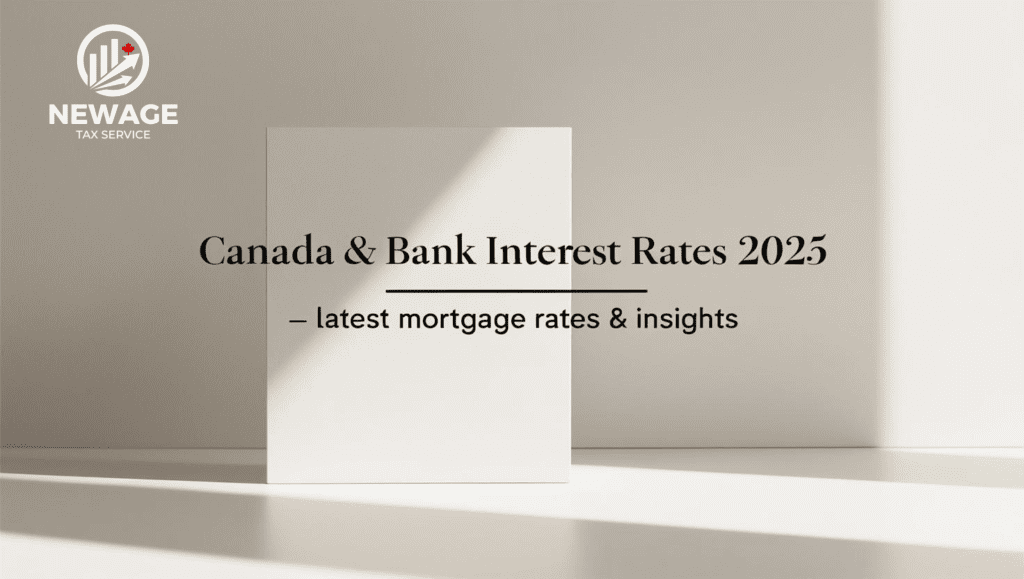Introduction
In 2025, Canada’s mortgage landscape is shifting due to the Bank of Canada’s (BoC) recent monetary policy adjustments. Whether you’re a first-time homebuyer or looking to refinance, understanding the latest Bank Interest Rates, Canada, and Revised Rates on Mortgage is crucial.
This guide explores the current mortgage rates, the impact of BoC’s rate cuts, and insights from major banks offering mortgages in Canada.
1. Bank of Canada’s Recent Interest Rate Changes
The Bank of Canada has been actively adjusting its rates to stabilize the economy.
- January 29, 2025: The BoC cut its overnight rate by 25 basis points to 3%, continuing the downward trend from 5.0% in June 2024.
- The goal is to lower borrowing costs, boost home affordability, and maintain inflation control.
- This policy shift has led to mortgage rates declining across Canadian banks and lenders.
2. Current Mortgage Interest Rates in Canada (2025)
| Mortgage Type | Average Interest Rate (2025) |
|---|---|
| 5-Year Fixed-Rate | 4.5% – 4.74% |
| 5-Year Variable-Rate | 4.0% – 4.85% |
These rates vary based on the lender, your credit score, and economic trends.
3. Fixed-Rate Mortgages: Pros & Cons
A fixed-rate mortgage offers stability, making it a preferred choice for homeowners who want predictable payments.
Pros:
✔ Stable monthly payments for easy budgeting.
✔ Protection from future interest rate hikes.
Cons:
❌ Typically higher initial rates than variable mortgages.
❌ Less flexibility if rates decrease during your term.
For example:
- RBC offers a 5-year fixed mortgage at 4.64%, providing a secure payment structure.
- BMO has a similar offer but with flexible prepayment options.
4. Variable-Rate Mortgages: Pros & Cons
Variable-rate mortgages (VRMs) fluctuate based on the prime rate, making them ideal for borrowers who can handle some risk.
Pros:
✔ Typically lower initial rates compared to fixed mortgages.
✔ If BoC continues rate cuts, monthly payments could decrease.
Cons:
❌ Monthly payments may rise if rates increase.
❌ Uncertainty can make long-term financial planning harder.
For example:
- TD Bank offers a 5-year variable mortgage at 4.85%, with the potential to drop if rates continue to decline.
5. Major Canadian Banks Offering Mortgages
Several major banks in Canada provide a range of mortgage products to suit different financial needs.
| Bank | Mortgage Type | Starting Rates (2025) |
|---|---|---|
| RBC | Fixed & Variable | 4.64% – 4.85% |
| TD Bank | Variable & Hybrid | 4.85% |
| BMO | Fixed & Adjustable | 4.50% – 4.74% |
| CIBC | Custom Mortgage Plans | Varies |
| Scotiabank | Fixed & Variable | 4.60% – 4.80% |
Mortgage brokers can also help compare rates from multiple lenders.
6. Alternatives to Traditional Mortgages
Apart from standard fixed and variable mortgages, other options exist:
- CMHC-Insured Mortgages: Government-backed loans for first-time buyers with a low down payment (5%).
- Home Equity Line of Credit (HELOC): A flexible credit line for homeowners with built-up equity.
- Adjustable-Rate Mortgages (ARMs): Similar to VRMs but linked to a broader range of economic indicators.
7. How to Choose the Best Mortgage in 2025
✅ Check Your Financial Situation
- Maintain a good credit score (700+ recommended).
- Ensure a low debt-to-income ratio for better rates.
✅ Compare Lenders
- Don’t settle on the first offer—shop around for better rates and terms.
✅ Monitor Market Trends
- BoC rate cuts suggest further declines in mortgage rates in 2025, making variable rates attractive.
Conclusion
With Canada’s mortgage rates trending downward in 2025, homebuyers have an opportunity to secure better deals. Whether choosing a fixed-rate mortgage for stability or a variable-rate mortgage for potential savings, it’s essential to evaluate your financial position and lender options.

